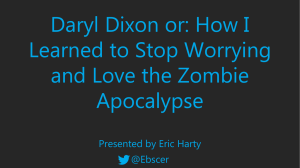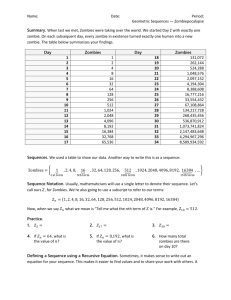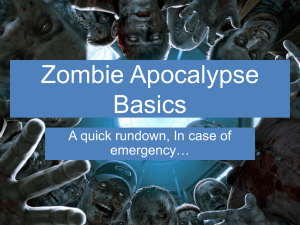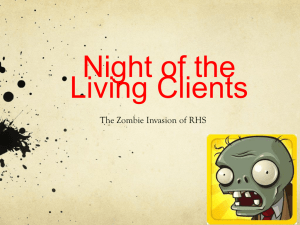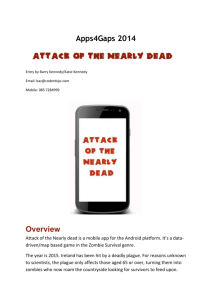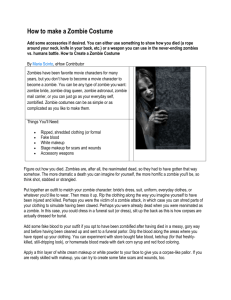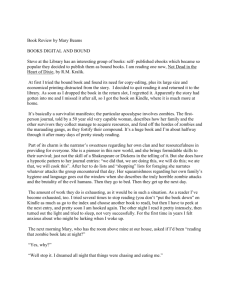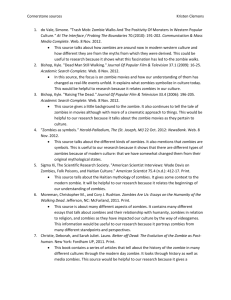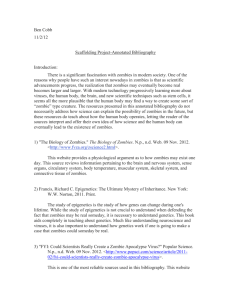Body & Society 2008 14: 83
advertisement
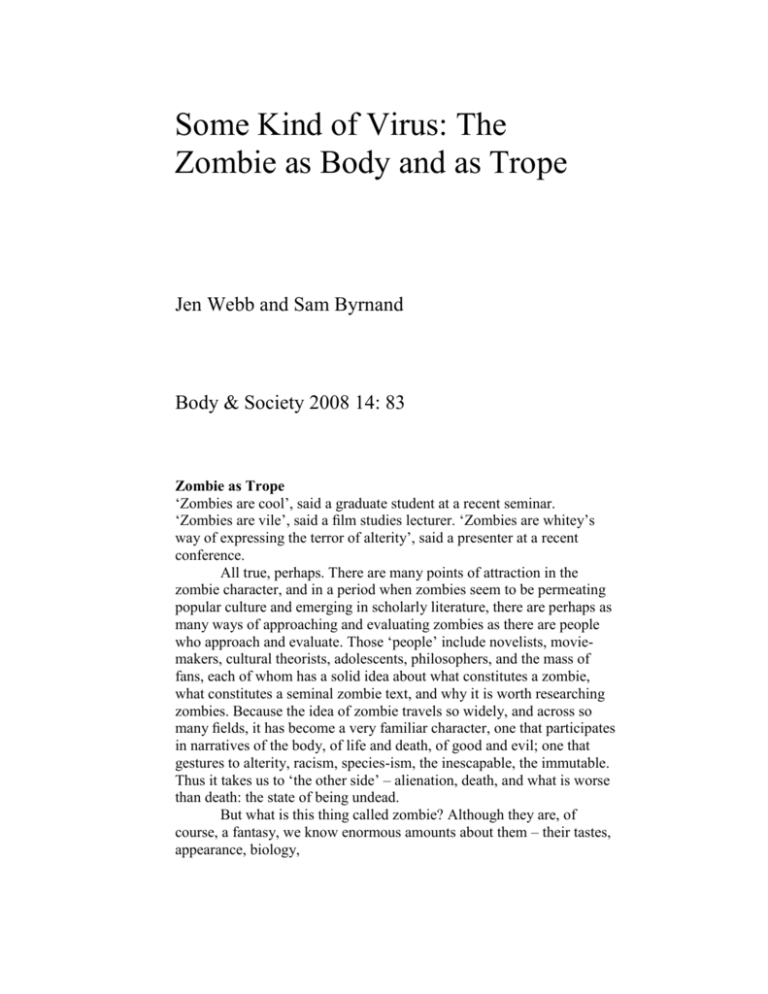
Some Kind of Virus: The Zombie as Body and as Trope Jen Webb and Sam Byrnand Body & Society 2008 14: 83 Zombie as Trope ‘Zombies are cool’, said a graduate student at a recent seminar. ‘Zombies are vile’, said a film studies lecturer. ‘Zombies are whitey’s way of expressing the terror of alterity’, said a presenter at a recent conference. All true, perhaps. There are many points of attraction in the zombie character, and in a period when zombies seem to be permeating popular culture and emerging in scholarly literature, there are perhaps as many ways of approaching and evaluating zombies as there are people who approach and evaluate. Those ‘people’ include novelists, moviemakers, cultural theorists, adolescents, philosophers, and the mass of fans, each of whom has a solid idea about what constitutes a zombie, what constitutes a seminal zombie text, and why it is worth researching zombies. Because the idea of zombie travels so widely, and across so many fields, it has become a very familiar character, one that participates in narratives of the body, of life and death, of good and evil; one that gestures to alterity, racism, species-ism, the inescapable, the immutable. Thus it takes us to ‘the other side’ – alienation, death, and what is worse than death: the state of being undead. But what is this thing called zombie? Although they are, of course, a fantasy, we know enormous amounts about them – their tastes, appearance, biology, 84 ■ reasons for their emergence, how to neutralize them, why we should despise and fear them. This knowledge comes in large part from the armies of fans who, driven by some sort of anthropological urge, have studied and recorded their ontology and behaviour. Thus we know, for instance, that zombies are unrelentingly, unquenchably and indiscriminately hungry. When they see their environment, they see a place whose only observable features are food. They are also utterly implacable because they are, in David Chalmers’ term, ‘all dark inside’, lacking ethical or affective judgements. Yet they are disturbingly like us, and as such can act as springboards into ways of understanding the ontology of the subject. Like humans, zombies aren’t social isolates – they seem to prefer to live in groups, within built environments; like us, they actively colonize spaces for themselves; like us – at least in the West – they seek to spread well beyond their local region, and to dominate people and places. Consequently, though we do not know their points of origin, we typically come across them in the most ordinary and safe of environments – our own home ground. Indeed, there is always something ‘nearly me’ about the monster. This is evident in how easily we are infected with ‘zombie-ness’: a mere bite from one of them, or a drop of their bodily fluid into my eye, and I too am become zombie. The transmission of the ‘virus’ between us and them indicates our closeness: viruses (mostly) travel between like species, and the job of the average zombie seems to be, (a) eat as many people as possible, and (b) infect as many people as possible. So, the story goes, once they have arrived among us, carrying ‘some kind of virus’, they metastasize rapidly, devastating cities, decimating populations. The idea of zombie has similarly ramified, or metastasized, infiltrating society at a number of levels; and given that Western (and especially US) media products now permeate the global media, and hence inf(l)ect global audiences, zombies are also travelling more widely than in previous times. Because of their long history – especially in the West – and because of the rhetorical turns associated with their use in different periods and different cultural fields, we take the perspective that zombies are as much trope as character or effect, and hence are available to be reworked and reframed in any number of ways. In this article we attempt to contribute to the debate, and suggest what we see as useful ways of thinking ‘zombie’. The philosopher David Chalmers (1996) has identified a number of ‘turns’ – or categories – of zombie, the better known being the Hollywood form, of reanimated flesh-eating corpses; the Haitian form, of living people deprived through magic or medicine of soul and free will; and philosophical or p-zombies, which look like humans, but lack consciousness. We do not, in this article, take up the two latter forms, but focus rather on the Hollywood form and some of what we consider its immediate progenitors. And we are particularly interested in what the 85 ■ narrative suggests about what it means to be a human being in the contemporary world: a world dominated by neoliberal economics, by globalization, and by the work of capitalist production that simultaneously enchants and disenchants peoples in the interest of pursuing a dream of radical, hegemonic capital. We take this position because the zombie trope is so often associated with power and its exploitation, as is exemplified by the Shadow in Ursula Leguin’s Wizard of Earthsea, or the golem in Cynthia Ozick’s The Puttermesser Papers. A precursor to this type is the shletl golem/zombie on which Ozick’s was based; this ‘zombie’ was created to relieve people of heavy or dirty work, and to protect its maker, most particularly from pogroms. The zombies in this category have a fantastical/theological point of origin because they were made by invoking the holy words of creation or powerful words of magic. But they are not safe creatures: in each golem narrative they exceed the control of their creators, running amok and threatening, rather than serving, them. In this respect, they can be read as metaphors of our own shadow selves, the part that always returns to bite us and which we can never keep fully repressed. We see this notion that there is a ‘zombie’ within each of us in a novel like Joseph Conrad’s Heart of Darkness and its movie spin-off, Francis Ford Coppola’s Apocalypse Now (1979). Here the zombie trope is mobilized as a critique of colonialism, and a warning: the mindless brutality of the colonizers and soldiers ends only in horror, in terror. Indeed, it is instructive that the zombie trope always generates fear. In the stories where their provenance is a military event or scientific accident – Boris Sagal’s 1971 film The Omega Man, for instance – it is fear of the self. In those that locate the origin of zombiedom in an alien attack – the Alien film series, for instance – it is fear of the other. In either case, the zombie character also draws attention to social alienation, and to the drive that catches people up in a maelstrom of ceaseless consumption, ceaseless destruction. The Psychoanalytical Analogue Psychoanalysis provides one point of entry to the trope of zombie – particularly as it allows readings that focus on identity and loss – because of zombies’ likeness to human beings. This is well established in the academic literature, and in popular narratives too. Think Day of the Dead, where the crazy scientist, Dr Logan, insists of his zombies: ‘They are us, they are extensions of us, they are the same animals.’ The same, yet not identical: zombies are ‘people without minds’; the undead; and thus are both us and not us. In this respect, they are like the dead themselves, and so must be exiled from the community of the living. Michel de Certeau writes: ■ 86 The dying are outcasts because they are deviants in an institution organized by and for the conservation of life. An ‘anticipated mourning’, a phenomenon of institutional rejection, puts them away in advance in ‘the dead man’s room’; it surrounds them with silence or, worse yet, with lives that protect the living against the voice that would break out of this enclosure to cry: ‘I am going to die’. (1984: 190–1) Only in finding a way to ignore, overlook or eradicate them can we forget the fact that as they are, so too I will be. And yet, and yet. What is remarkable about so many zombie movies is that the survivors of the plague/accident/alien invasion that caused the infection do so little to distinguish themselves from zombies; it’s very much a case of as you are, so too am I. The death of Charlton Heston’s Robert Neville in Omega Man, for instance, is no real loss: it is difficult to empathize fully with him and his grim, unrelenting performance of isolated, violent and angry male, particularly when he is set against his ‘zombie’ bête noir, the charismatic Matthias (Anthony Zerbe). In story after story, there seems to be no limit to the survivors’ rage, or their incapacity to empathize with one another; in the horror of their changed world, they become like zombies, ‘all dark inside’. This manifests sometimes in the terrible violence shown in movies like Day of the Dead where the soldiers turn on citizens and on themselves, or in 28 Days Later where the hero, Jim, takes on many of the physical and emotional characteristics of the ‘infected’ so that he might survive the horror being dealt out by his own kind. The zombies in this film have been infected with a viral rage; Jim avoids the infection, but can’t avoid or control his innate, personal rage. The effect in either case is practically identical: for all intents and purposes, in the moments of his rage Jim is zombie. In fact, the deleted scenes show Jim running unmolested among a pack of the infected to gain entry into the soldiers’ house: he sides with the zombies in order to kill his human tormentors, and even the zombies can’t tell that he’s not one of them. This zombification manifests also in the dampening of affect, seen in movies like Kurt Wimmer’s Equilibrium (2002) where the government has identified as society’s main enemy the sensate realm. In this society everyone knows the danger of feeling, and the related need to ‘destroy the ability to feel’; sense criminals are summarily executed; books, art and music are destroyed (indeed, the movie opens with the destruction of the Mona Lisa); and the community is kept numb, or neutralized (zombified), by taking a drug called Prozium, a kind of mirthless soma which makes it impossible to them to care for others. In either case, what we have is people who, like zombies, have no capacity for subjective phenomenal experiences, or for ethical or affective judgement – and this alone is cause for the fear they generate in audiences for such films. As Shaviro writes: ‘The hardest thing to acknowledge is that the living dead are not radically Other so much as 87 ■ they serve to awaken a passion for otherness and for vertiginous disidentification that is already latent within our own selves’ (1993: 98). They may lack empathy, but even the numbed residents of Libria, the dystopic community in Equilibrium, experience hunger, another characteristic shared by zombies and people. What is interesting about zombies’ hunger, though, is that unlike us they don’t need to eat to maintain (their version of) life. They eat because they crave, not because they need; they are motivated – in Freudian terms – by drive which is, Freud writes, ‘so to say our mythology. Drives are mythical entities, magnificent in their indefiniteness’ (1966 [1933]: 22). Drive, that is, lacks an obvious generative structure; it is not desire; it is not need. Let us diverge, briefly, to mark the differences between drive and the other forces that motivate us. One important force is desire, a term adopted by scholars from across the spectrum. We do not intend to engage in a long discussion on the complexities of this issue, but only to note that generally in the literature, desires are on the one hand culturally constituted (so that, for instance, the consumer society generates in its subjects a longing for commodity objects) and are on the other hand the fundamental aspect of identity and its vicissitudes. Subjects are because they desire; and yet desire is also the point at which we are separated from ourselves, made aware that we lack. In desiring, we search for the self, the idea of a unified and intrinsic individual self, which of course does not exist, and which is why desire can never be satisfied. A second motivating force is need. Need is generally seen as based in the body: as a matter of physiological requirement. Where desire is mediated by culture, need is usually regarded as unmediated: as the raw urgency of the body to eat, drink, rest and seek shelter. But it is not quite as simple as that: need is not just a phenomenological effect, and desire is not just a cultural effect; they are part of the same operation. Deleuze and Guattari write: ‘Desire is not bolstered by needs, but rather the contrary; needs are derived from desire’ (1983: 27). Think, for instance, of the need for vehicular transport, something that emerged out of a desire for faster, more comfortable travel, and is now a necessity for people in much of the world. Thus need, for humans, seems to be mediated just as desire is; and like desire it can never be satisfied because, as long as we are alive, we must attend to the body and its needs. So here is a point at which humans and zombies diverge. We desire, constantly seeking that which we do not have in order to fill the empty place of the self; zombies show no signs of independent identity or understanding of the lack at the heart of the self. 1 We need, constantly searching out what the body requires to maintain physical life; zombies seem not to respond to the normal requirements of the body for rest, nourishment and shelter. So when it comes to both The 88 ■ need and desire, humans operate according to a different economy from that of zombies. Drive is another matter, because here humans and zombies do seem to have something in common. And drive, of course, is neither need nor desire, but is the unthinking response of the subject to what Lacan, following Freud, has called ‘the Thing’ (1992: 51–2) – the ‘little a’. The ‘little a’ – the other – is what emerges in the primordial void created when a person leaves the world of sensation for the realm of language, the symbolic order. The Thing – the object a – created in the moment we are inscribed as subjects of the symbolic order, remains as a hollow in the self, what we can call the ‘dark inside’, which renders us always Other to ourselves. From this point, we can never be fully ‘at home’, because there’s always something else in there with us, lurking. This notion that there is an absence-presence within – something uncanny, or ‘beyond our ken’ about ourselves – is not just a truism of cultural theory; it is also a physiological principle. Freud alludes to this in his essay ‘Instincts and their Vicissitudes’ (1915), where he writes that the source of the drive is somatic – located in the body. Neurologist Richard Cytowic develops this, writing that we are never free agents because there is, buried in our brains and our cognitive functioning, the inexpressible, the unconnectable, the thing that makes us work as beings, yet which we cannot access. ‘Part(s) of us’, he writes, ‘are inaccessible to self-awareness, the latter being only the tip of the iceberg of who and what we really are. The “I” is a superficial self-awareness constructed by our unfathomable part’ (Cytowic, 1993: 170–1). The ‘unfathomable part’, the unacknowledged yet frightening and obscene Thing within, may well have the capacity to zombie us from the start of our career as subject, but also exists as something alluring. The object a fascinates because it gestures towards who and what we might be: someone with the capacity to reject the symbolic order and return to the wildness of the id. It fascinates too because it recalls the essential knowledge that death, the ultimate unfathomable, is the only way to regain what we have lost, to fill the void. The problem is, of course, that at the point of death, when the subject is returned to the void, it’s too late to know or articulate this recovered fullness, so the Thing, the inner zombie, remains just out of reach. Hence, very like death, it always haunts us, reminding us of the risk that we could end up trapped – like Antigone 2 – between physical and symbolic deaths. Just as anxious self-aware humans try to suture the gap between the self and its unfathomable parts, and between those two deaths, so too producers of zombietype narratives often attempt to reconcile the two sides. In Wizard of Earthsea, for instance, Ged acknowledges and embraces his shadow, transforming it from his threat to his strength. In the Alien series, Ripley becomes both human and 89 ■ monster, and only in that capacity is able to manage the horror. In Day of the Dead, Dr Logan turns zombie Bob into a kind of pet by means of behavioural treatment – and Bob later avenges his death as only a human would do. Their ‘like-us-ness’ manifests; something is reconciled; the horror is put back into the closet, out of sight – until the next relapse. The Capitalist Analogue So that is one way of looking at the zombie trope: as a way of illuminating something about the constitution and functioning of the self – and particularly of the inaccessibility of (much of) the self to the laws of language, culture and society. And it’s one that segues smoothly into a second reading, one that involves a critique of the capitalist system, because of the central issue, those motivating forces of drive, desire and need that can all be termed aspects of hunger, of appetite. Capitalism, we suggest, works as an analogue of zombiedom because it too is predicated on insatiable appetite, and the drive to consume. But it is not necessarily the mindless consumption of the zombie. Marx and Engels point out that the satisfying of basic hungers/needs/desires is: the first premise of all human existence and, therefore, of all history . . . men must be in a . . . position to live in order to ‘make history’. . . . Life involves before everything else eating and drinking, a habitation, clothing and many other things. The first historical act is thus the production of the means to satisfy these needs, the production of material life itself. (Marx and Engels, 1970: 48) Unless we satisfy the basic hungers, we cannot live. Without life, we cannot ‘make history’. Zombies seem to operate purely on the basis of drive, and have no obvious concern with ‘the production of material life’ (all they do is consume and destroy). Taking Marx and Engels’ point, we can say that being human is about more than basic hungers; it is about individuals organizing to achieve aims, and thus all our needs and hungers are peculiarly social and cultural, and hence peculiarly mediated. There is something unthinking, unthought, about zombie consumption; there is something organized, systematic, about capitalist consumption. The latter is, indeed, a system, one that works to produce history, one every bit as teleological as any religion or, indeed, as classical Marxism. And like many religions, and like Marxism, it has global aspirations and a global reach. What seems to be happening on a global scale is the production not just of history, but of hunger, in people around the world; and the production of a way of thinking that posits capitalism as the only viable system for social organization and geopolitical relations as well as for economic exchange. It is, indeed, allencompassing in scale and overwhelming in scope. And it is predicated on a wanting, on what ■ 90 works sometimes according to drive, sometimes according to desire, sometimes according to need, that can be seen as another manifestation of the virus that renders us zombies, or zombie-like. We know, for instance, that our needs/desires motivate us to seek their satisfaction, but that we are never really satisfied. The fabulous dinner, the new car, the cool drink, the attractive companion: none fill our desire; all are mere stepping-stones leading us, continually, to more and more wants. As Zygmunt Bauman observes: ‘For good consumers it is not the satisfaction of the needs one is tormented by, but the torments of desires never yet sensed or suspected’ (1998: 82). We want more, and more, and more; and we want, for the most part, unreflectively. Such unrelenting desire has in common with the economy a ceaseless flow, asBaudrillard writes: The compulsion toward liquidity, flow, and an accelerated circulation of what is psychic, sexual, or pertaining to the body is the exact replica of the force which rules market value. (1987: 25) The ‘force’ he mentions can, we suggest, be identified with what is the dominant ideology, or form of reason, in the contemporary era. This is neoliberalism, the current form of what, following Immanuel Wallerstein (2000), we can call the world-system – which comprises the global civil society, the globalized economy and the increasingly globalized polity. Perhaps the most important aspect of globalization-asneoliberalism is the way it has combined the retreat of the state with the advance of global capitalism – often in the face of resistance from local, regional and national interests. It operates according to the same logic of capitalism: the idea of freedom. But the freedom of neoliberalist capitalism is one that aims to liberate us from everything, even, as philosopher Michael Polanyi writes, ‘from obligations toward truth and justice, reducing reason to its own caricature’ (Polanyi and Prosch, 1975: 14). Freedom, for neoliberalism, for capitalism, equals free trade: an unbounded economy and the unfettered circulation of people, capital and goods. Its founding principle is the pursuit of self-interest through competition between producers and producers, consumers and consumers. Now, across the world, the profit motive overrules virtually all other motives, including religious, nationalist and environmental ones, in a system that comprises tentacles of trade and exchange crisscrossing the globe, promising rewards to those who serve the capitalist system, and setting in place a blurring of need and desire that turns us all into mindless consumers. Capitalist competition is visible in its roughest, rawest form in depictions of the average zombie, who spends all his or her energies in struggling to gain more and more – the perfect consumer, the perfect exemplar of the search for personal advance through self-interest. George Romero’s 1968 movie Night of the Living 91 ■ Dead and its sequels are particularly good examples of zombie films that lay down the terms by which the zombie trope ‘reads’ capitalism. Like their predecessor, Sidney Salkow’s Last Man on Earth (1964), and any number of films up to, say, Danny Boyle’s 28 Days Later (2002), Romero’s films point to the ways in which major social institutions become the site for zombification. Set in shopping malls, churches, schools, laboratories, prisons or army barracks, they show the horror at the heart of the everyday; they show the terrible inevitability of infection in what should be safe environments; they show how easily the protectors of society turn into a threat, or become its jailers. In this they are allegories for, or analogies of, American capital that, in terms of geopolitics, globalized economy and geoentertainment, is the perfect hegemon: provider and protector that is also the ultimate infection. They show, too, what is perhaps the most devastating aspect of zombie as metaphor for the current economy: there is no (evident) way out. Your only option, when faced with the zombie menace, is to kill or be killed. Either way you’re screwed, because you are dead, or you have become what you fear. The act of violence that removes the horror and threat of the zombie reconstructs me, the human, as zombie – a being that is only body, without empathy, without respect for life: very like the marketplace, in fact. Capitalism is nothing like the state of being-zombie, of course, because it is not the living dead, but a system of economic and social organization based on individualism and private ownership of the means of production. Yet like zombies, it is all-absorbing with respect to its environment: Hardt and Negri point out that: ‘Today nearly all of humanity is to some degree absorbed within or subordinated to the networks of capitalist exploitation’ (2000: 43). In other words, global capitalism is boundless and insatiable. It depends entirely upon consumption – after all, why produce something no one will buy? – and must generate hunger, or desire, in people who may have no practical need for the object or service being marketed. To advance this mission, capitalism also, and again like zombiedom, depends on excess, or a surplus. Just as we rarely see a solitary zombie, but usually a mob, an extraordinary surfeit of them – far more than should be necessary to consume a city – so too capitalism produces far too much because it works through the operation of surplus value, and surplus value is realized most effectively when there is excessive consumption. So we can read capitalism as a self-replicating endemic virus, as Marx might have but didn’t quite put it, when he wrote: The bourgeoisie, by the rapid improvement of all instruments of production, by the immensely facilitated means of communication, draws all, even the most barbarian, nations into civilization. . . . It compels all nations, on pain of extinction, to adopt the bourgeois mode of production; it compels them to introduce what it calls civilization into their midst, i.e., to become bourgeois themselves. In one word, it creates a world after its own image. (Marx, 1977: 225) ■ 92 Once a capitalist bites you, in other words, you’ve had it – you’ve caught the bug. And we capitalists do in fact infect others, despite our best intentions. The issue is not that we all begin to buy the same kind of jeans and eat the same potato chips, but that this apparently most democratic system of economic management leads not to a democracy of wealth, but to a divided society in both global and local terms: the few-too-few who have nearly everything, and the many-too-many who are reduced to little or nothing. Those multitudes comprise what Heidegger termed ‘the standing army’ of workers, crowds of shoppers at the mall, the couch potatoes on a million sofas across the nation, all reduced to unthinking obedience and/or consumption – to zombie. The obesity crisis to which the media is currently paying so much attention is in this respect connected to capitalism-as-zombie: mindless consumption of the unnecessary by the unneedy. Consider the endless advertising and promotion of unhealthy fattening food, and alongside this the plethora of health promotions, pharmaceutical advertisements and diet products, all of which suggests that we, the people, are being zombied. Our consciousness of self and control of self have been seized by a bottomless hunger to consume no matter what, and no matter that it doesn’t nourish us. However, the imposition of a market logic on the world-system has not been entirely successful – or rather, has not occurred without resistance – and it would be wrong to argue that even Western society has been completely given over to capitalism. Despite the most positive statements issued by mouthpieces for the market and despite its necessary teleology, there have always been gaps in its practice. John Frow (1999: 2) points to a number of areas in which society has gone against market interests, as it did with respect to the abolition of slavery, or the setting of other limits on capitalism during the Victorian era in Britain when, despite the apparent giving over of everything to the capitalist dream, the state invested enormously in roads, rail, libraries, schools, and hospitals. Indeed, ‘every extension of the commodity form’, Frow writes, ‘has been met with resistance and often with reversal’ (1997: 135). The zombie trope may well buy into this countercapitalism as part of the generalized assault it seems to make on global capital. So many of the examples – the Dead series, Last Man on Earth, The Omega Man or 28 Days Later – show the heart of capitalist settlement littered with the detritus of modern civilization: paper and old clothes drifting among the bodies on pavements, cars uselessly lining the streets, and looted stores opening wistfully out onto the emptiness beyond. Perhaps what we can suggest about this use of the trope is that the zombie is the worm that turned. Capitalism produced and overproduced it, and now it is eating capitalism. Jean-Paul Sartre pointed out the same sort of issue in his critique of the colonial mission. Colonialism manifestly worked as a kind of zombie-ing practice, in a ■ 93 Heart of Darkness kind of way: colonial administrators and the colonists who came with them typically treated locals not as people, but as exploitable objects, commodities, mute things, things without affect. But as Hegel might have argued, and as Sartre thunders at the colonizers in his preface to Franz Fanon’s The Wretched of the Earth, this relationship is precariously balanced. Just as the colonizers had zombied, or dehumanized the locals, Sartre wrote, so too the locals will come to see them not as humans, but as things, and to zombie them in turn. ‘Turn and turn about’, he warns; ‘in these shadows from whence a new dawn will break, it is you who are the zombies’ (1963: 33). In de Certeau’s terms, we might call this a ‘re-bite’: writing about the ‘uncanniness’ of a repressed history, he pointed out that we can never destroy without the destroyed thing returning to take its own vengeance, in its own way: ‘The dead haunt the living. The past: it “rebites” [il re-mord] (it is a secret and repeated biting)’ (de Certeau 1986: 3). Fredric Jameson picks up on similar concerns in The Geopolitical Aesthetic (1992), particularly when he points out the way in which films like Alien represent a world of capitalist-driven, technological totalization, where every part of life is alienated and infiltrated by institutions and agents operating within the global machine of capitalism. Worse than the alien monsters in the first film of the Alien series is, first, the affectless android, a zombie-type, who will destroy his fellow crew without batting an eye; and, second, the company man, who will alienate every value, and every living thing, for the sake of the company’s profits. Their violent ends, as well as their previous actions, recall Kurtz and what he said in the appalling coda to Heart of Darkness and Apocalypse Now: ‘The horror! The horror!’ This is surely the only response to the realization that everyone and every value has been consumed – and that now it’s his turn to go to the wall. Capitalism has the same heartless all-consuming character, particularly in its pure form in which the ‘invisible hand’ of the market is supposed to bring about a dynamic equilibrium between supply and demand. This has had devastating outcomes: though the invisible hand may even out imbalances between supply and demand over time, this often comes about at great human cost, requiring the ‘surplus’ people in a community to die or flee; viz. the Irish Potato Famine of 1846–50. The problem is that capital doesn’t care, and doesn’t weigh human costs. It is simply zombie – hungry, and hence focused on feeding and expanding regardless of the consequences. The Cognitive Analogue This is rather demoralizing material that says very little about the capacity of human beings to resist the slide into zombiedom, or to inoculate ourselves against 94 ■ twin viruses of all-consuming drive or heartless emptiness. A third – and more optimistic – perspective that we can bring to the zombie trope is an analogy between thinking and being that might function as a mode of resistance to the trend towards becoming zombie. Richard Cytowic points out the inadequacy of using an android logic to approach the workings of the mind, writing: ‘All analogues of the mind to a machine are inadequate because it is emotion, much more than reason, that makes us human’ (1993: 156, his emphasis). And intimately associated with emotion is qualia – or phenomenological life, the feeling of being. We do not intend, in this final section, to engage with the pzombie debate except to gesture towards the way in which it has been picked up by philosophers of cognition. For some of them, the zombie trope expressed as p-zombie has been a very alluring site because of the potential it seems to offer for reflection about what it means to be human. Not all agree about the value of zombies as an analogue for humans. Daniel Dennett, for instance, is the poster boy for those philosophers who reject the idea of p-zombie as a logical absurdity: to be human, he argues/ they argue, is to have consciousness; if zombies have consciousness, whether or not they also have a soul, then they must, Dennett argues, be human, and not zombies. He writes: Sometimes philosophers clutch an insupportable hypothesis to their bosoms and run headlong over the cliff edge. Then, like cartoon characters, they hang there in mid-air, until they notice what they have done and gravity takes over. Just such a boon is the philosophers’ concept of a zombie. (1995: 323) This is a perfectly reasonable position, but it does miss the opportunity to take on board something very interesting about cognition: Dennett’s fellow philosophers, poised on the cliff, may have used language clumsily to argue their point, but perhaps he was just a touch too serious, and has himself fallen into a category error by reading a metaphor as an actuality. While we agree with Dennett about the incongruity of deploying a creature of fiction, a rhetorical device, as a serious research tool, we do argue that zombies as trope, not actuality, remain valuable springboards into consideration of human ontology. Principally, we take the fantasy of zombie morphology as a way of considering what it means to be a human, living in a community of humans; and what it means to be a cognitive being. ‘Living systems’, biologist Humberto Maturana writes, ‘are cognitive systems, and living as a process is a process of cognition’ (Maturana and Varela, 1980: 13). While zombies are not precisely living – in the human sense – they’re not dead either, or inanimate. Instead, they seem to fulfil some of the main requirements of a cognitive organism, specifically the aspect biologists call autopoiesis: ‘a way 95 ■ of establishing and maintaining a system’s boundary by selecting meaningful elements – or distinctions the system can use – out of an otherwise indistinct, “noisy”, environment’ (cited in Tabbi, 2002: xxiii). This is a model for the emergence of the self, any sort of self, as the result of a combination of circularity and complexity on the part of systems. From amoeba through freshwater prawns to Einstein, Maturana insists, we exist and form ourselves by interacting with our environments, and adjusting to the conditions in which we find ourselves. In this definition, zombies are also living, cognitive entities. They are biological phenomena because their brains clearly undertake at least some information-processing activities; after all, they generally retain some memory of their pre-zombie lives, and this capacity is surely found only in the functioning brain. Zombies have discrimination too, in the sense that they respond to their environment; and they are capable of some quality of interaction, whether to seek out and eat human beings, or to huddle together in their dismal spaces. They might have pus for brains, and yet their remarkable similarity to us can be used to turn our attention to embodied knowledge, embodied cognition, embodied identity, and in this way move us closer to an aesthetics in our human as well as our professional identity: a resensitizing of ourselves as subjects to the world of human intercourse, and against zombie practices. In this respect, it is worth pointing out zombies’ relation to art, which is either to ignore it, or destroy it. Despite our many similarities, one thing that is distinctly different between (most) humans and zombies is their level of adroitness. Zombies are clumsy, and insensitive, with words and objects, and do not respond aesthetically or empathically to cultural products. In Libria, the postulated society in Equilibrium, art was destroyed without hesitation; and even the very smooth Matthias in The Omega Man cries out at Charlton Heston, ‘Your art, your science, it was all a nightmare, and now it’s done!’ And this is a point at which humans and zombies part company, and at which the conditions for cognitive being run up against some limits. Zombies are incapable of nuance, of sensitivity, and so while they might have been able to fit the older definition of cognition – which distinguished emotion from reason – they don’t fit the current definition which incorporates ‘all information-processing activities of the brain, ranging from the analysis of immediate stimuli to the organisation of subjective experience’ (Tsur, 2002). In this reading, pace Maturana, cognition must include emotional and aesthetic capacity. Melanie Swalwell (2002) describes the importance of embodied sensory experiences in bringing the processes of cognition to light, and hence of aesthetic factors in how we perceive and conceive our world. The zombie aspect of the self and of society may reject the aesthetic domain, but it is here, in the world of ■ 96 creative production, that the foundations for cognitive function can be found; as Barbara Stafford points out: In the widespread postmodern denigration of the aesthetic, what is forgotten is that from Leibniz to Schiller, the term connoted the integration of mental activity with feeling. Aisthesis, as perception or sensation, has in post-Cartesian and especially postKantian thought become separated from cognition. Rediscovering its pragmatic capacity to bridge experience and rationality, emotion and logic, seems all the more important in the era of virtual reality and seemingly nonmediated media. (1998: 52) We rediscover its capacity when we start with the premise that cognition generally involves the creative shaping of our conceptions of the world. We rediscover its capacity in considering how metaphors drive the cognitive process – laying down fresh pathways for thought and practice. We rediscover its capacity when we recognize that art, by reinforcing ways of looking at the world, is necessarily a cognitive process, and that therefore the zombie heart of all of us and of society, with its devotion to consumption and its incapacity to interact, is not the way to be human. Conclusion: Some Kind of Analogue The homology between humans and zombies is, we argue, one very solid reason for their enduring appeal and fascination: we humans are arrested by ourselves, and by that of which we are capable. The likeness between zombies and humans, along with the terrifying otherness of zombies, is pitched – in our reading – at the unendurable, unending story of otherness, the underside of our symbolic order that is posed by the three weird sisters: death, the Sublime and the Real. Zombies analogize the Other in these forms, and bring our attention to the limit and the boundary of life and meaning in part because they themselves have escaped this Other, Freud’s ‘Thing’. For us it is the limit, but not for them because they have already identified with the ‘other’ side, and been separated from the order of humanity. We have not been, however hungry or heartless we may be. Like Jim in 28 Days Later, we may perform as zombie at times, yet we can always pull back and return to the human condition because we have not yet crossed the boundary which marks the end of self-awareness, removes the human subject from the symbolic order and returns it to the Real. So why look to zombies, or the zombie trope to discuss this? Because, given the internal pressures described so richly by psychologists and psychiatrists, and even more so the external pressures of globalized capital, the easier thing to do would be to collapse into zombie status: mindlessly consume, and/or exile from ourselves the capacity to feel, and thus to be. Mikhail Bakhtin writes, ‘the better 97 ■ a person understands the degree to which he is externally determined, the closer he comes to understanding and exercising his own freedom’ (1981: 139). Bringing zombie-ness, the hidden aspects of the self and society, into light may allow us to consider more reflectively what it means to be a ‘me’. Notes 1. Indeed, zombies cannot be subjects, strictly speaking, because they are outside the symbolic order, the domain of language: they utter, but don’t articulate, cannot speak. At the point of zombifi-cation, they exited the symbolic order, and thus cannot experience desire in the psychoanalytic sense. 2. As described in Jacques Lacan (1992: Seminar 7). In this respect, we might say, Antigone is the first of this form of zombie. References Bakhtin, Mikhail (1981) The Dialogic Imagination. Austin, TX: University of Texas Press. Baudrillard, Jean (1987) Forget Foucault, trans. Nicole Dufresne. New York: Semiotext(e). Bauman, Zygmunt (1998) Globalization: The Human Consequence. Cambridge: Polity Press. Certeau, Michel de (1984) The Practice of Everyday Life, trans. Steven Rendall. Berkeley, CA: University of California Press. Certeau, Michel de (1986) Heterologies: Discourse on the Other, trans. Brian Massumi. Minneapolis, MN: University of Minnesota Press. Chalmers, David J. (1996) The Conscious Mind: In Search of a Fundamental Theory. New York and Oxford: Oxford University Press. Cytowic, Richard (1993) The Man Who Tasted Shapes. London: Abacus. Deleuze, Gilles and Félix Guattari (1983) Anti-Oedipus: Capitalism and Schizophrenia, trans. R. Hurley et al. Minneapolis, MN: University of Minnesota Press. Dennett, Daniel (1995) ‘The Unimagined Preposterousness of Zombies: Commentary on T. Moody, O. Flanagan and T. Polger’, Journal of Consciousness Studies 2(4): 322–6. Freud, Sigmund (1957 [1915]) ‘Instincts and their Vicissitudes’, pp. 111–40 in The Standard Edition of the Complete Psychological Works of Sigmund Freud, vol. 14, ed. James Strachey. New York: Norton. Freud, Sigmund (1966 [1933]) New Introductory Lectures on Psychoanalysis, pp. 3–182 in The Standard Edition of the Complete Psychological Works of Sigmund Freud, vol. 22, ed. James Strachey. London: The Hogarth Press and the Institute of Psychoanalysis. Frow, John (1997) Time and Commodity Culture: Essays in Cultural Theory and Postmodernity. Oxford: Clarendon Press. Frow, John (1999) ‘Res publica’, URL (consulted January 2002): http://home.vicnet.net.au/~abr/FebMar99/fro.html Hardt, Michael and Antonio Negri (2000) Empire. Cambridge, MA: Harvard University Press. Jameson, Fredric (1992) The Geopolitical Aesthetic: Cinema and Space in the World System. Bloomington, IN: Indiana University Press. Lacan, Jacques (1992) The Ethics of Psychoanalysis: The Seminar of Jacques Lacan, Book VII, trans. Dennis Porter. London: Routledge. Marx, Karl (1977) Selected Writings, ed. David McLellan. Oxford: Oxford University Press. Marx, Karl and Friedrich Engels (1970) The German Ideology, ed. C.J. Arthur. New York: International Publishers.Downloaded from bod.sagepub.com at UNIV OF CENTRAL FLORIDA on May 2, 2011Maturana, Humberto and Francisco Varela (1980) Autopoiesis and Cognition: The Realization of the Living. Dordrecht: D. Reidel. Polanyi, Michael and Harry Prosch (1975) Meaning. Chicago, IL: University of Chicago Press. Sartre, Jean-Paul (1963) ‘Preface’, pp. 7–33 in Frantz Fanon, The Wretched of the Earth. New York: Grove Press. Shaviro, Steven (1993) The Cinematic Body. Minneapolis, MN: University of Minnesota Press. Stafford, Barbara (1998) Good Looking: Essays on the Virtue of Images. Cambridge, MA: MIT Press. Swalwell, Melanie (2002) ‘The Senses and Memory in Intercultural Cinema’, Film-Philosophy 6(32), URL (consulted September 2006) http://www.film-philosophy.com/vol6– 2002/n32swalwell Tabbi, Joseph (2002) Cognitive Fictions. Minneapolis, MN: University of Minnesota Press. Tsur, Reuven (2002) ‘Aspects of Cognitive Poetics’, pp. 279–318 in Elena Semino and Jonathan Culpeper (eds) Cognitive Stylistics – Language and Cognition in Text Analysis. Amsterdam: John Benjamins. Wallerstein, Immanuel (2000) ‘The Rise and Future Demise of the Capitalist World System’, pp. 233–8 in John Beynon and David Dunkerley (eds) Globalization: The Reader. London: Athlone. Jen Webb is Director of Communication Research at the University of Canberra. Her recent publications include Reading the Visual (2004) and the forthcoming Understanding Representation (SAGE, 2008). She is currently researching the connection between human rights and creative practice. Sam Byrnand is an independent cultural producer based in Brisbane, Australia. The author of a number of short stories and film scripts, he is currently writing and coproducing a mockumentary on hiphop culture in Brisbane.
